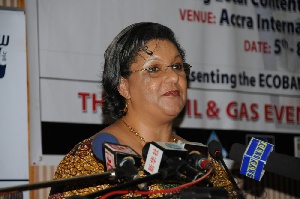Miss Hannah Tetteh, Minister of Trade and Industry, has expressed government’s willingness to provide pragmatic measures to address the current economic challenges undermining the development of the country.
She mentioned some of the challenges as high unemployment rate, rising levels of public debt, high interest rates, infrastructural deficits, high public sector wage bills and volatile international commodity markets and its attendant effect on foreign exchange earnings.
She said the challenges would be addressed through policy interventions and programmes outlined in the Ghana Shared Growth and Development Agenda.
These include sustaining current micro-economic stability, improving transport infrastructure, enhancing human development, developing Private sector competitiveness and improving science and technology in the country.
Miss Tetteh made this known at the First Ghana Economic Forum organised by Business and Financial Times and supported by Virgin Atlantic in Accra.
The event which was on the theme “Integrating people, sytems and technologies for sustainable economic development” brought together about 150 participants.
They included chief executive officers, board chairmen, directors-general, legal advisors, entrepreneurs, civil society leaders, and senior level decision makers in public & private sector organizations in Ghana and development partners.
The forum was aimed to deliberate on how Ghana could sustain the macroeconomic gains made in recent times, and the strategy for sustaining the growth trajectory on the three key pillars of people, systems and technology deployment.
The forum served as a platform to highlight on major concerns and key drivers of the economy, the intersecting players and how the leadership tool can be better developed to oil the wheels of development.
Some of the areas discussed included what to do to unlock Ghana’s human capital in terms of education, skills development, job creation and poverty reduction; rethinking the country’s systems for improved productivity at all levels as well as utilizing technology to drive intermediary businesses in both public and private sector organizations.
On the panel to discuss the topics were Ms. Abena Amoah, Founder & CEO, Baobab Advisors, Dr Joe Abbey, Executive Director of CEPA, Dr. John Kwakye, Senior Economist-IEA, Nana Owusu Afari, President of AGI, Mr Foluso Philips, Founder of Philips Consulting Group-Nigeria and Mr Kweku Andoh Awotwi, Chief Executive of Volta River Authority.
Miss Tetteh said according to Global Competitive Index (GCI), the country continued to exhibit strong public institutions and governance indicators with relatively high government efficiency particularly in regional comparison.
She said the report indicated that, Ghana’s infrastructure was good by regional standards, especially the state of its ports which was ranked 66th out of 142; adding that the financial markets was also described as relatively well developed and ranked 61st.
According to her, the position of Ghana as 114 out of 142 in the GCI served as a wakeup call for government to intensify efforts to improve the business environment to make the country a preferred destination for investments in the West African sub-region.
She expressed the hope that the forum would come up with appropriate recommendations to address the economic challenges in a manner that would enhance the achievement of the country’s development agenda.
Mrs Edith Dankwa, Executive Director of Business and Financial Times, said over the years, the country had witnessed a tremendous growth in its Gross Domestic Product (GDP) from GH¢23 billion in 2007 to GH¢59 billion in 2011 and had also seen the economy grow at 14.4 per cent in 2011 which was driven by oil exports.
She said the fiscal deficits had been falling to manageable levels, reaching around four per cent of GDP in 2011, adding that the economy had also enjoyed single digit inflation since 2010, currently trending below nine per cent.
Despite all these progress, she said, the country still faced a number of critical challenges that had held back growth and slowed down the process of poverty-alleviation and development.
She commended government’s effort in ensuring sound business environment and urged all stakeholders to work effectively to drive and sustain the Ghana’s economic growth.**
Business News of Friday, 4 May 2012
Source: GNA













